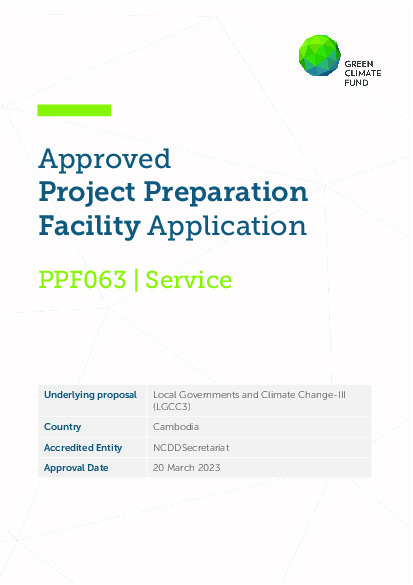Local Governments and Climate Change-III (LGCC3)
Cambodia has a climate-dependent economy that has been negatively impacted in recent years. Rising temperatures, increased intensity of weather events, changes and rainfall patterns and sea-level rise have put traditional farming systems under pressure, and decreased the availability of water resources. The poorest households located in the most vulnerable districts lack the adaptive capacity to overcome these challenges, while local governments lack the necessary technical capacity and resources to support community resilience.
The Ministry of Environment has been nominated as the National Designated Authority (NDA) to lead their engagement with the GCF and thus act as the country’s GCF focal point. The National Committee for Sub-National Democratic Development Secretariat (NCDD-S) of Cambodia was nominated as an Accredited Entity (AEs) of the GCF and has gained direct access in 2019. Both entities have been leading the implementation of the LGCC-I and II projects since 2011 with technical adaptation support from UNCDF. The current LGCC-III concept builds upon a Concept Note initially submitted to GCF by the MoE in January 2017 and on the latest submission by NCDDS in 2021.
With the GCF support, the LGCC-3 project will directly address the barriers and gaps faced by local administrations by providing adequate capacity and funding at the district level, with climate adaptation investments integrated into the planning and budgetary cycles of local and district government plans. Investments will complement the national adaptation plan process by responding to climate challenges with locally appropriate solutions and by directing resources to the most vulnerable communities.
LGCC-3 is owned and implemented by the Royal Government of Cambodia (RGC) and aligned with the Cambodian Climate Change Strategic Plan 2014-2023 (CCCSP), the Nationally Determined Contribution 2020 (NDC) to the UNFCCC and SDGs numbers 1, 11 and 13. Proposed interventions of LGCC-3 reflect adaptation priorities in the NDC and are aligned with specific functions transferred to local governments under the RGC's National Programme for Sub-National Democratic Development (NP-SNDD), which also provides the implementation framework for the project.
